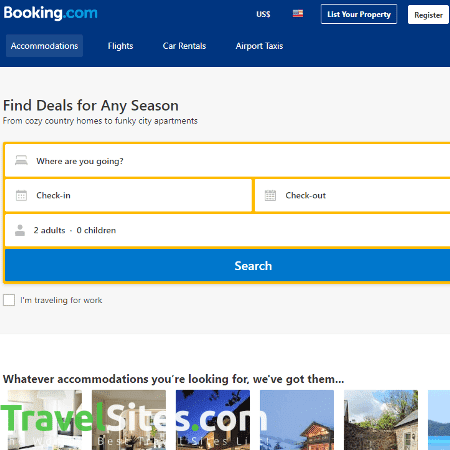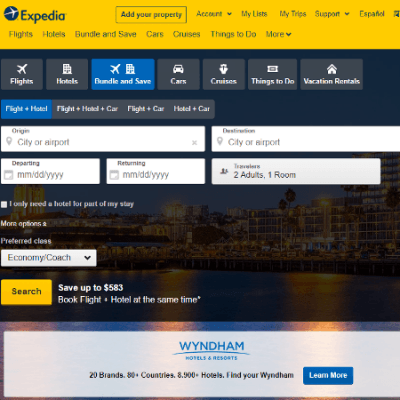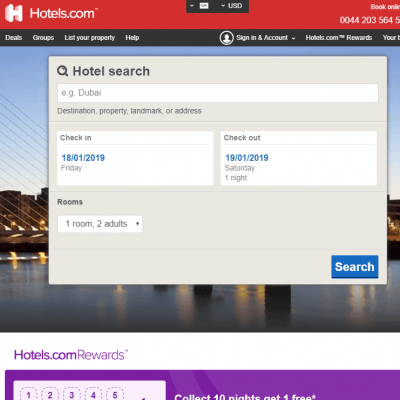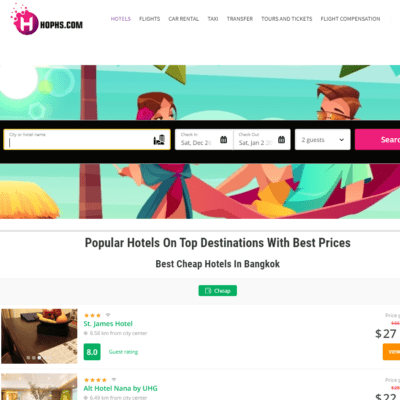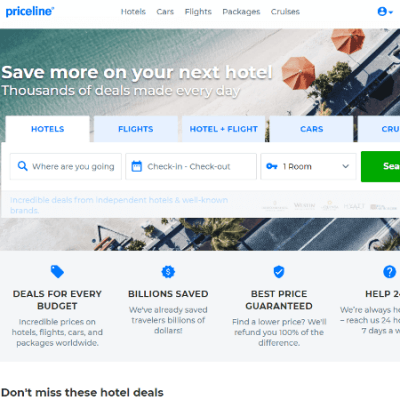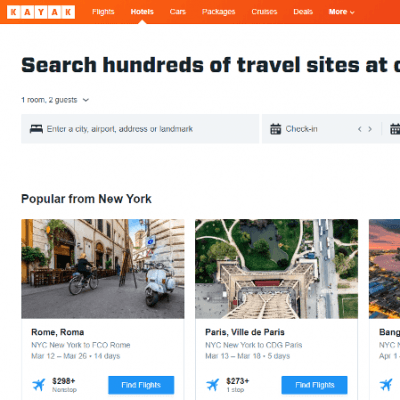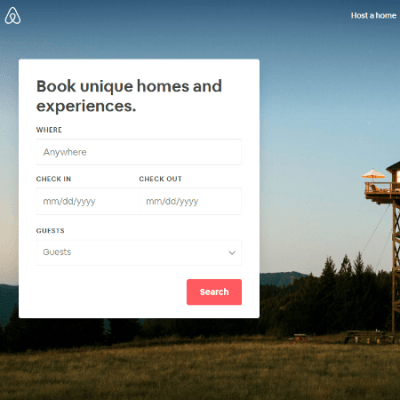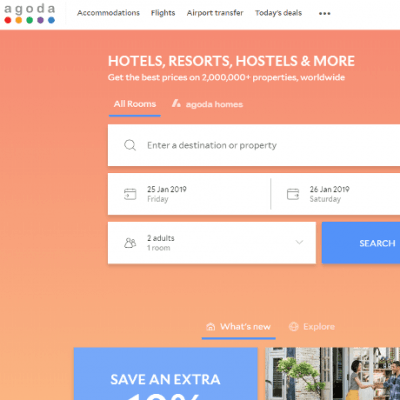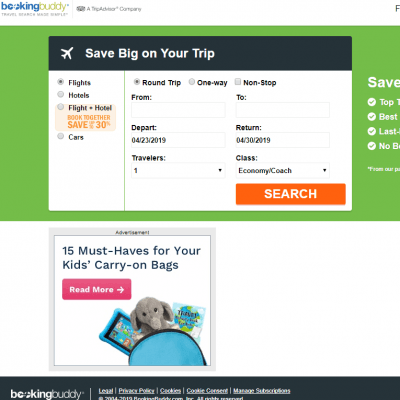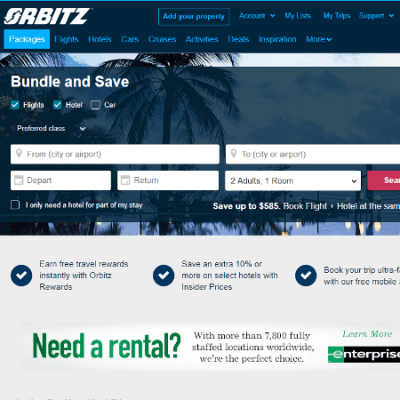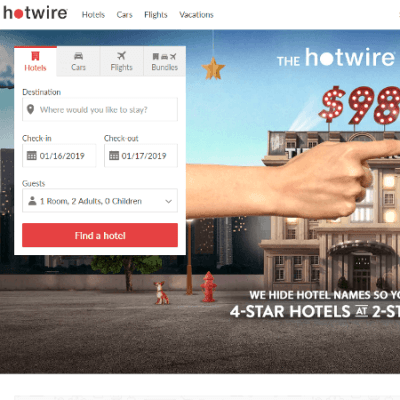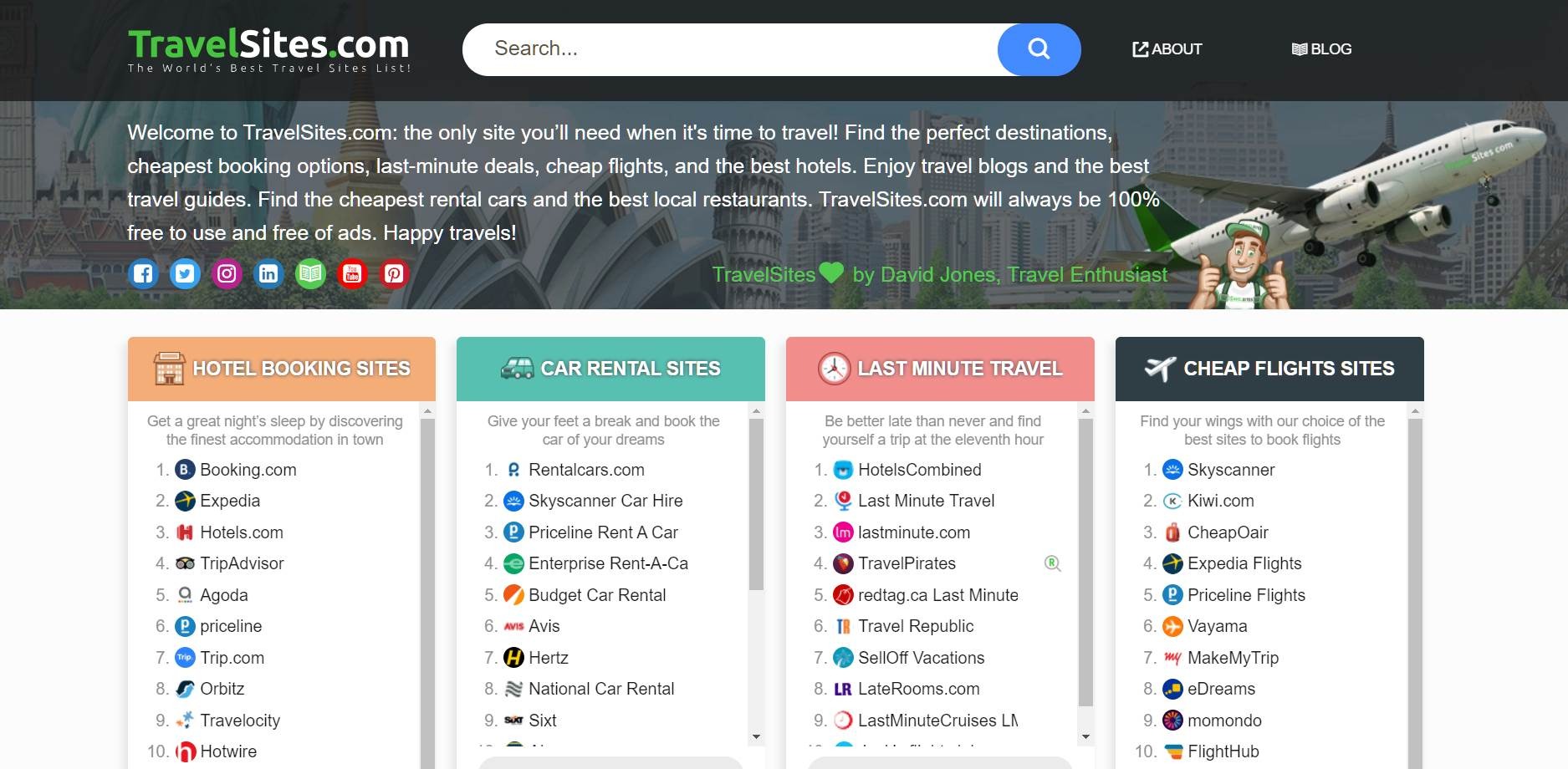Booking.com
booking.com
What does Booking.com do?
Booking.com is one of the most popular, reliable, safe, and established travel sites on the web today. Whether you are looking to book a hotel room, rent a car, find the cheapest flight, or figure out what to do at your destination of choice, Booking.com will have you covered. Sites like these are the reason that travel agents are all but extinct – because they help you figure out every step of your vacation without any extra fees. Any time that I’m planning a trip, I always check out Booking.com, even if I don’t always end up using it in the end (hey, my only true allegiance is to finding the best deal!).
There is a good chance that you are already familiar with Booking.com, at least to some degree. It’s been online for 24 years now! Booking.com is extremely popular, and it is vast. With over 28 million listings, it would be hard not to find a great deal on travel accommodations here. Available in 43 different languages, Booking.com is a global enterprise. Book hotel rooms and flights in your own language or try practicing in the native tongue of the country you plan to visit – the choice is yours!
Is Booking.com the best site for booking travel accommodations? Well, without diving in and taking a look at every component of the site, it would be hard to say with any accuracy. However, if you’ve been wondering whether Booking.com is the right travel site for you, today is your lucky day … I am going to pull back the curtain and show you everything you need to know about this site, so that you can make the best-informed decision possible before you spend hundreds (potentially thousands!) of your hard-earned dollars here.
Travel ain’t cheap! The best booking sites, though, make it as affordable as possible while also offering a top-notch user experience. So, without further ado, let’s take a closer look at everything that Booking.com has to offer.
Who owns Booking.com?
Booking.com was the result of a merger. When Bookings.nl (founded in 1996 by Geert-Jan Bruinsma) and Bookings Online (founded by Sicco, Marijn Muyser, Alec Behrens, and Bas Lemmens as bookings.org) joined forces in 2000, the Booking.com that we know and love today was officially born.
This new company, though, had a bit of a rocky start. I suppose you could say that they were a little ahead of their time. In 1997, Bruinsma sought to run an ad in the popular Dutch newspaper, De Telegraaf, only to be rejected because the publication only accepted ads that had phone numbers, not websites. To add to a bad luck streak, Expedia even refused to acquire Booking.com in 2002 (I bet they’re kicking themselves for that decision now!).
In 2005, though, The Priceline Group (now known as Booking Holdings) had the foresight to buy the company for $133 million. Later on, this nascent version of Booking.com worked in conjunction with Activehotels.com, a European hotel booking site which Priceline purchased for $161 million in September of the same year (only 9 months prior).
Eventually, though, as you may have guessed, Active Hotels and Booking.com merged into one site. This strategic merging of the two sites managed to bring the parent company from a $19 million loss in 2002 to a net profit of $1.1 billion in 2011. To this day, this is considered by some to be “the best acquisition in internet history,” seeing as no other acquisition in the digital travel industry has yielded anywhere near the same profit margin.
Today, Booking.com still sits atop of the online travel space as one of the best and most frequented sites for booking hotels, airfare, and other travel accommodations in the world.
Is booking on Booking.com safe?
I think that the design of Booking.com is fairly intuitive … especially considering the sheer volume of features and bookings available here. It cannot be an easy task to translate millions of listings and several booking types into a seamless and user-friendly site design. Nevertheless, Booking.com has managed to do just that.
As soon as I land on the home page, I know how to navigate the site. That’s precisely what I look for in a site like this. I can either plug my desired location and dates of travel into a prominently featured quick search box right at the top of the page, allowing you to get right down to business (no need to waste time). Or I can scroll down a bit and browse by the most popular destinations, property type, popular vacation packages, home stays, or travel blog articles.
As far as the actual browsing function is concerned, I think that, once again, Booking.com does a pretty good job. The site offers a very familiar layout, allowing you to tweak your input info (destination, dates, guests, etc.) and filtering options in a box on the left-hand side of the page, with your search results spanning the right-hand side. There are a plethora of options to filter booking results, plus about 9 different ways to organize them.
My only complaint, from a design perspective (and I know that I might be nitpicking here) is that I would have liked to have seen the search results section of the page be independent of the rest of the page. In other words, when I scroll through the results of hotels, I wish that the search box and quick filter options stayed in place. This would allow, I think, for slightly easier browsing and adjusting of search parameters. Other than that, though, this site is clearly designed by some of the best in the business.
How does Booking.com for customers work?
Booking.com has come a long way from the days of being merely a site that provides travelers with hotel listings. Today, this site can be a one-stop shop for all your travel booking needs. Book a flight, a hotel, and a restaurant reservation without ever leaving Booking.com. The sheer scope of what you can book here is staggering, making it one of the most features rich travel sites on the web.
That’s not all that you can do on Booking.com, though. Users can also book flight and hotel combos, vacation packages, airport taxi services, and reserve admission to all the hottest attractions. Not everything that Booking.com offers requires money either. There is plenty of cool travel content to enjoy for free.
Booking.com, for instance, has a surprisingly high-quality travel blog. Updated regularly, feel free to check back in whenever you want for some travel inspiration or search for fun things to do in your destination of choice before you leave (or while you’re on the plane, or once you get to the hotel, or 3 days in when you’ve done everything on your list). These articles are well-written, informative, and sure to get you excited for your trip.
Hotels, flights, rental cars, attractions, packages, special deals, taxis, and a travel blog … Booking.com would have more than enough to offer if that were the complete list. But, of course, it is not! Living in the age of Airbnb, Booking.com has proven that they are able to adapt and remain relevant throughout the years. In addition to everything else that I’ve already listed, you can also book a home share on Booking.com, in case you are looking for a bit of a more intimate, localized experience.
How is with Booking.com app and Desktop Experience?
Not only does Booking.com offer a perfectly optimized mobile site, but they also have one of the best travel apps on the market. For a completely streamlined experience with a remarkably smooth mobile interface, Booking.com’s mobile app is the perfect companion to your travel plans.
Available on both Android and iOS devices, the Booking.com app is definitely worth a download (it is free, after all). Add it to your travel app folder and pull it up any time you need to plan a trip, or any time that you are fantasizing about your next trip, shopping around to see where you might go and where you might stay once the window of opportunity opens itself up next.
With a 4.8 star rating (out of 5) on the Apple App Store, I think the quality of the Booking.com app speaks for itself.
Is Booking.com cheaper than direct?
Booking.com (both the site and the app) are 100% free to use. Obviously, you will have to pay whatever the price is for your lodging or airfare (duh), but there is no cost associated with using the site or booking through the site – they make the bulk of their money through commission (paid by the hotel, property, etc.).

I am a professional travel writer and travel enthusiast who traveled the world twice, so I am sharing my firsthand knowledge about everything related to travel and spending time abroad.
- Intuitive, user-friendly interface
- Plenty of search filters and ‘sort by’ options
- A detailed description of accommodations, rooms, amenities, etc.
- Very mobile friendly (incredible app!)
- A one-stop-shop for travel accommodations
- Location services not always 100% accurate
- The site is a little cluttered sometimes
